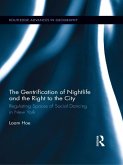Shifts in America's socioeconomic geography have been documented since the 1960s, demonstrating the reversal of white flight and the reshaping of a nation, evidenced by the growing divide between underprivileged citizens and the wealthy. As state and local governments continue to scale back social services that impact health and well-being, how will disenfranchised groups fare in this expanding, market-driven global society? Uprooting Urban America addresses this query by examining the social consequences of policies that change urban landscapes during the process of gentrification. In this book, junior and senior scholars present contemporary research findings and innovative strategies within the fields of education, healthcare, geography, sociology and policy studies. The book is ideal for graduate and advanced graduate level courses in the disciplines of education, sociology, cultural studies, political science, public policy, urban planning, social justice education and health care and human services.
Dieser Download kann aus rechtlichen Gründen nur mit Rechnungsadresse in A, D ausgeliefert werden.
«Uprooting Urban America is an original and outstanding contribution to debates on gentrification via its specific analytic focus on housing, healthcare services, education and community organizing. At a time when human needs are being aggressively appropriated and financialized, the contributions to this volume - carefully argued and expertly edited - not only offer elaborate analyses of the implications, but can also assist struggles to protect the legacies of the welfare state against predatory attacks by this generation's vulture capitalists.» (Tom Slater, Reader in Urban Geography, University of Edinburgh)
«Uprooting Urban America explores the interrelationship of gentrification and neoliberal policies in healthcare, housing and education in the colonization of urban space, powerfully demonstrating their constitutive role in the production of special inequality, dispossession and injustice - and possibilities of resistance.» (Pauline Lipman, Author of The New Political Economy of Urban Education: Neoliberalism, Race and the Right to the City)
«2014 is the fiftieth anniversary of the coining of the term 'gentrification' by the British sociologist Ruth Glass. On its anniversary, this book lays bare the visceral impact of this process on urban America, not just on housing, but on education, public health and much more. A wonderful addition to the gentrification literature, the book underlines the wholesale gentrification of American society and the socially unjust uprooting and displacement of the poor. But it does much more too - in the face of a post-political American landscape, this book discusses interventions and resistances, and in so doing it gives much-needed hope and ideas for how Americans can fight this pervasive agenda.» (Loretta Lees, University of Leicester)
«Uprooting Urban America explores the interrelationship of gentrification and neoliberal policies in healthcare, housing and education in the colonization of urban space, powerfully demonstrating their constitutive role in the production of special inequality, dispossession and injustice - and possibilities of resistance.» (Pauline Lipman, Author of The New Political Economy of Urban Education: Neoliberalism, Race and the Right to the City)
«2014 is the fiftieth anniversary of the coining of the term 'gentrification' by the British sociologist Ruth Glass. On its anniversary, this book lays bare the visceral impact of this process on urban America, not just on housing, but on education, public health and much more. A wonderful addition to the gentrification literature, the book underlines the wholesale gentrification of American society and the socially unjust uprooting and displacement of the poor. But it does much more too - in the face of a post-political American landscape, this book discusses interventions and resistances, and in so doing it gives much-needed hope and ideas for how Americans can fight this pervasive agenda.» (Loretta Lees, University of Leicester)
«Uprooting Urban America is an original and outstanding contribution to debates on gentrification via its specific analytic focus on housing, healthcare services, education and community organizing. At a time when human needs are being aggressively appropriated and financialized, the contributions to this volume - carefully argued and expertly edited - not only offer elaborate analyses of the implications, but can also assist struggles to protect the legacies of the welfare state against predatory attacks by this generation's vulture capitalists.» (Tom Slater, Reader in Urban Geography, University of Edinburgh)
«Uprooting Urban America explores the interrelationship of gentrification and neoliberal policies in healthcare, housing and education in the colonization of urban space, powerfully demonstrating their constitutive role in the production of special inequality, dispossession and injustice - and possibilities of resistance.» (Pauline Lipman, Author of The New Political Economy of Urban Education: Neoliberalism, Race and the Right to the City)
«2014 is the fiftieth anniversary of the coining of the term 'gentrification' by the British sociologist Ruth Glass. On its anniversary, this book lays bare the visceral impact of this process on urban America, not just on housing, but on education, public health and much more. A wonderful addition to the gentrification literature, the book underlines the wholesale gentrification of American society and the socially unjust uprooting and displacement of the poor. But it does much more too - in the face of a post-political American landscape, this book discusses interventions and resistances, and in so doing it gives much-needed hope and ideas for how Americans can fight this pervasive agenda.» (Loretta Lees, University of Leicester)
«Uprooting Urban America explores the interrelationship of gentrification and neoliberal policies in healthcare, housing and education in the colonization of urban space, powerfully demonstrating their constitutive role in the production of special inequality, dispossession and injustice - and possibilities of resistance.» (Pauline Lipman, Author of The New Political Economy of Urban Education: Neoliberalism, Race and the Right to the City)
«2014 is the fiftieth anniversary of the coining of the term 'gentrification' by the British sociologist Ruth Glass. On its anniversary, this book lays bare the visceral impact of this process on urban America, not just on housing, but on education, public health and much more. A wonderful addition to the gentrification literature, the book underlines the wholesale gentrification of American society and the socially unjust uprooting and displacement of the poor. But it does much more too - in the face of a post-political American landscape, this book discusses interventions and resistances, and in so doing it gives much-needed hope and ideas for how Americans can fight this pervasive agenda.» (Loretta Lees, University of Leicester)









